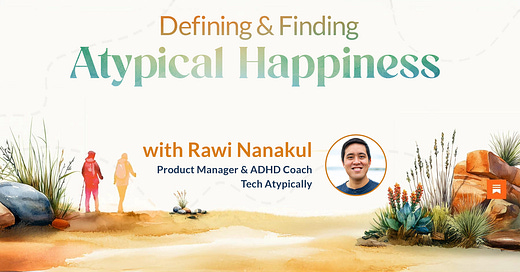
#81🤗 How to use Invitations to Create the Space for ADHD Self-Care
How asking for what you need, invites others to do the same.
Welcome to Tech Atypically 👋, your weekly blog for navigating the challenges of ADHD and being in the tech industry.
I am an ADHD and product management coach helping you change one belief and take one action each week.
🐼Are you struggling at work and fear the worst? Talk to a team of experts that can help.
Part 6 of the Self-Care Series
🦋The Takeaways
Belief: Asking for self-care time is a burden on others.
Reality: When you ask for what you need, you invite others to do the same.
Action: Create an invitation for self-care by asking for what you need.
⭐️Introduction
Self-care is a crucial piece of maintaining your mental health and productivity when you have ADHD. You probably know you should do it. However, knowing where you’ll get the time to do it, often stops you before you begin.
This week, I'll explore why it's so challenging to prioritize your own needs and how when you do, invites those with the same struggle to do the same for themselves.

😵💫The Belief – Asking for self-care time is a burden on others
If you're like me, you struggle with the belief that making time for yourself comes at the expense of others. For me, it’s a belief rooted in self-loathing or self-hate. The feeling that I am flawed and unworthy of love from others.
I think it comes from a combination of having ADHD and growing up in a culture where love and acceptance were based on external achievement (good grades, good job, perceived social standing).
As a result, I am often insecure in my work and personal relationships. I make sure that am giving or helping people more than they are helping me. Because to do otherwise, would mean I would become a burden to them and I would lose yet another relationship.
For example, you might hesitate to ask your partner for time to go for a morning run, thinking it's an unfair sacrifice for them to take on more responsibilities while you're away. If you have children, this sense of guilt is amplified even more.
This belief can stop you from asking for time for self-care. Thus leading you on a path of burnout and resentment. In listening to the false belief, you end up with the thing you feared the most.
🤝The Reality – When you ask for what you need, you invite others to do the same
The truth is, when you voice your needs and make time for self-care, you're not being selfish - you're creating an invitation.
By asking for what you need, you create an environment where others feel comfortable doing the same. It's not a zero-sum game, but rather an invitation for mutual care and understanding.
Let's revisit the morning run example. When you ask your partner for that time, you're not just getting exercise - you're demonstrating the importance of self-care.
This might inspire your partner to ask for their own self-care time, like an evening dance class. The result? Both of you feel more fulfilled, energized, and supported in your relationship.
This principle extends beyond personal relationships into your professional life as well. As a product manager, you often focus solely on customer needs. While this is important, it's equally crucial to voice your insights and hypotheses.
By doing so, you establish trust and invite others to share their perspectives, leading to more innovative and collaborative solutions.
In being honest with your needs, you invite others to do the same.
🛠️The Action – Create an invitation for self-care by asking for what you need
Here are five strategies to help you create an invitation for self-care:
Identify your needs: Take time to reflect on what you truly need for your well-being. Is it exercise, quiet time, or a hobby? Be specific and honest with yourself.
Example: You might realize that you need 30 minutes of uninterrupted reading time each evening to decompress from work.
Communicate clearly: Express your needs to those around you. Be specific about what you're asking for and why it's important to you. Frame it as a positive for everyone involved.
Example: "Beloved, I'd like to go for a 30-minute run each morning. It helps me start the day with a clear mind, which makes me more present and patient with our family. Can we discuss how to make this work for both of us? And is there something you’d like to do?"
Start small and build: Begin with small, manageable requests to build your confidence in asking for what you need. As you and others adjust, you can gradually increase your self-care time.
Example: Start by asking for 10 minutes of alone time after work to meditate. Once this becomes routine, you can extend it to 20 or 30 minutes.
Lead by example in your professional life: Don't hesitate to share your insights and hypotheses at work. This invites others to do the same, fostering a culture of open communication and mutual respect.
Example: In a product meeting, you might say, "Based on my experience with our users, I believe feature X could solve problem Y. What are your thoughts on this?"
Practice self-compassion: Remember, you're not a burden. Your needs are valid and important. Treat yourself with the same kindness you'd offer a friend.
Example: When you feel guilty about taking time for yourself, try saying, "It's okay to need this time. Taking care of myself allows me to be better for others and do my best work."
✨Conclusion
Creating an invitation for self-care is about more than just taking care of yourself - it's about fostering an environment where everyone feels empowered to express their needs. By overcoming your fear of being a burden and asking for what you need, you not only improve your well-being but also invite others to do the same.
Whether it's in your personal relationships or professional roles, this approach builds trust, deepens connections, and ultimately leads to more fulfilling relationships.
Remember, self-care isn't selfish - it's a necessary step in creating a culture of mutual support and understanding.
🐼Join other tech professionals learning how to thrive at work with their neurodiversity.
⏭️Next Week
A guest post from









